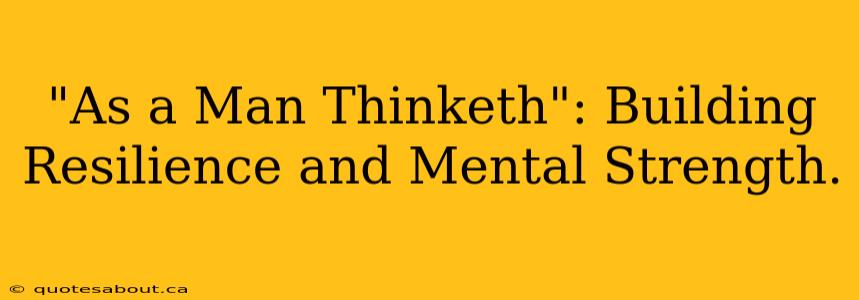James Allen's timeless classic, As a Man Thinketh, emphasizes the profound connection between our thoughts and our reality. While published over a century ago, its message resonates deeply today, particularly in the context of building resilience and mental strength. This book isn't just about positive thinking; it's a guide to cultivating a mindset that empowers us to overcome challenges and thrive amidst adversity. This post explores the key principles from As a Man Thinketh and how we can apply them to foster inner strength and resilience in our modern lives.
What is the Main Idea of "As a Man Thinketh"?
The core idea of As a Man Thinketh is the principle of cause and effect applied to the human mind. Allen argues that our thoughts are the primary cause of our circumstances, both internal (our feelings and emotions) and external (our experiences and relationships). Positive, constructive thoughts lead to positive outcomes, while negative, destructive thoughts yield negative consequences. It's not about wishing for a better life, but actively cultivating the mental habits that create it.
How Does "As a Man Thinketh" Help Build Resilience?
Resilience is the ability to bounce back from setbacks and adapt to challenging situations. As a Man Thinketh provides a framework for building this resilience through conscious thought management. By focusing on positive and constructive thoughts, we create a mental environment that strengthens our ability to cope with stress, overcome obstacles, and maintain a positive outlook even in the face of hardship. This isn't about ignoring difficulties; it's about facing them with a mindset of strength and determination, fueled by a belief in our inner capabilities.
What are the Practical Applications of "As a Man Thinketh"?
The book's principles translate into practical strategies for building mental strength:
-
Cultivating Gratitude: Regularly focusing on what we are grateful for shifts our attention away from negativity and fosters a sense of abundance and contentment. This gratitude practice acts as a powerful buffer against stress and fosters a more positive outlook.
-
Practicing Self-Control: Allen emphasizes the importance of controlling our thoughts and emotions. This means consciously choosing to replace negative thoughts with positive affirmations and practicing mindfulness to observe our thoughts without judgment.
-
Developing Self-Belief: Believing in our ability to overcome challenges is crucial for resilience. By focusing on our strengths and capabilities, we build confidence and the conviction to persevere through difficulties.
What are the Criticisms of "As a Man Thinketh"?
Some criticize As a Man Thinketh for oversimplifying the complex interplay between thoughts, emotions, and external circumstances. While the mind-body connection is undeniable, it's important to acknowledge that external factors—like societal structures, economic disparities, and trauma—significantly impact our lives. The book doesn't fully address these external challenges, focusing primarily on the internal transformation. It's crucial to use this philosophy as a tool for self-empowerment within a larger context of social and environmental realities.
How Can I Apply the Principles of "As a Man Thinketh" to My Daily Life?
The principles in As a Man Thinketh are not passive; they require consistent effort and practice. Here are some actionable steps:
- Morning Affirmations: Start your day with positive affirmations that reinforce your desired mental state.
- Mindful Meditation: Dedicate time each day to mindfulness, observing your thoughts without judgment.
- Gratitude Journaling: Regularly write down things you are grateful for.
- Challenge Negative Thoughts: When negative thoughts arise, consciously challenge them and replace them with more positive and realistic ones.
Is "As a Man Thinketh" Still Relevant Today?
Absolutely! In our fast-paced, often stressful world, the need for mental strength and resilience is paramount. As a Man Thinketh offers a timeless framework for cultivating a positive and empowering mindset, enabling us to navigate life's challenges with greater grace and strength. Its message is particularly relevant in today's digitally driven society where the constant bombardment of information can negatively impact our mental well-being. By consciously controlling our thoughts, as Allen advocates, we can create a more resilient and fulfilling life.

